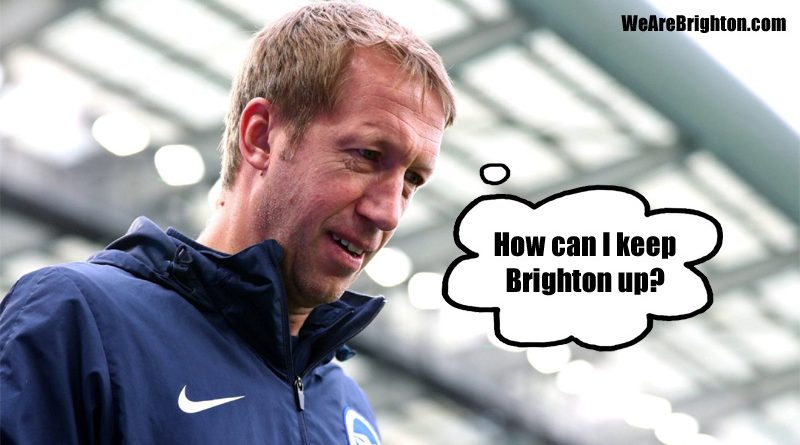A pragmatic Potter can save Brighton from relegation
Bramall Lane, Saturday 22nd February. A 1-1 draw against top six Sheffield United may not seem like a big deal, but it was the first time we saw Graham Potter abandon some of his footballing principles – and it gave hope that he is still the man to save Brighton from relegation.
Potter was appointed in the summer because the Albion believed him to be the man to take the club to the next level. Two league wins in the second half of the 2018-19 season coupled with some dire football had convinced Tony Bloom to part company with Chris Hughton, arguably the best manager Brighton have ever had, in favour of a more attack-minded manager.
It’s a move that we’ve seen many Premier League clubs make before – and normally it’s loaded with risk. Stoke City ditched Tony Pullis in favour of Mark Hughes and were promptly relegated a few years later.
Southampton got rid of Claude Puel as their supporters viewed a man who’d led them to eighth place and a League Cup Final as being too boring.
They’ve since rattled through three managers in three seasons, two of which have involved avoiding the Championship by the skin of their teeth.
West Ham United keep going through the process. Big Sam Allardyce didn’t fit ‘the West Ham way’ and so was replaced by Slaven Bilic.
Bilic subsequently led them into a relegation battle and was replaced with David Moyes. The fans didn’t like his football either and so in came Manuel Pellegrini. Fast forward 18 months and they’ve gone back to Moyes to try and keep them up this season.
Potter’s first season as a Premier League manager has been a mixed one so far. Up until Christmas, there was an undoubted improvement in the Albion’s style of play.
Hughton’s 4-4-1-1 or 4-3-3 was replaced with innovative 3-4-3 or 4-2-2-2 formations. We were playing free flowing attack football which at times blew away established top flight opponents, notably when beating Tottenham Hotspur 3-0 at the Amex and winning 2-1 away at Arsenal.
There was plenty of praise from pundits. Bloom even made what must rank as the most curious decision of his decade as chairman when he awarded Potter a new six year deal in November, despite the fact he’d only won four Premier League games in his life. In the intervening four months, we’ve tasted victory just twice.
At the start of Potter’s reign, it’s fair to say that results didn’t match performances. You could make a pretty strong case that with better game management, more clinical finishing and no stupid red cards in the first 30 minutes of matches, we should have been eight points better off by the end of October.
“Results will come” was the line trotted out after we dropped points against the likes of West Ham, Newcastle, Burnley, Southampton and Aston Villa.
Except they haven’t. Since the ink dried on Potter’s new contract, performances have tailed off and results – which weren’t exactly great in the first place – have gone with it.
Before the trip to Bramall Lane, the Albion’s four preceding fixtures have been against four sides below them in the table. The return? A measly two points, both of which were delivered thanks to ridiculous own goals from West Ham’s Angelo Ogbonna and Watford’s Adrian Mariappa.
Potterball hasn’t worked for weeks now. There is a time and a place for playing your way out from the back. For selecting a back four based on can pass the ball rather than who can win a header. For trying to pour forward in attack at all costs and leaving yourself open at the other end.
An away game when you are mire in a relegation battle isn’t it – and if his Brighton team selection and tactics at Sheffield United were anything to go by, Potter seems to have realised this. His new-found pragmatism could keep the Albion in the Premier League.
For all the positives that have come with Potterball this season, there have been some glaring problems with it too. The persistent selection of Adam Webster over Shane Duffy has been a role bone of contention, Potter having broken up arguably the best central defensive partnership outside of the top six because Webster can play a 20 yard pass more successfully than Duffy.
There have been some appalling moments of game management in which we have quite literally chucked games away through Potter’s desire to attack and play football, even in the final minutes of fixtures which should have yielded hard-earned points.
Burnley scored a last minute goal at the Amex to draw 1-1 in September. October’s defeat at Villa was even worse. The Albion had battled brilliantly for over an hour with only 10 men following Aaron Mooy’s red card and looked on course to walk away with an important point.
The sensible thing to do would have been to shut up shop and see out the final 30 seconds. Yet the Albion wanted more, Solly March played a hopeful ball to try and get Pascal Gross in on goal, Villa seized possession quite easily and less than a minute later, Matt Targett scored a winner for the hosts.
Potter has gone into every game thinking that Brighton can play in a certain style, regardless of opponents. That isn’t how the Premier League works.
Sometimes, you have to accept that there will be days in which you need to adapt if you want to take points. Forget your principles and do whatever you can to secure a result which can help keep you in the Premier League.
When you go to a Liverpool or Manchester City, you need your best defenders on the pitch – aka Duffy – because those who can block shots, win tackles and challenge for headers are going to be more important to getting a result than a player who can pass the ball – aka Webster.
Sheffield United at home in December was the biggest example of this. Potter didn’t seem to take into account any of the threats that the Blades posed.
There was no plan to stop their overlapping centre backs charging forward at will. Chris Wilder named two bustling centre forwards in David McGoldrick and Oliver McBurnie and yet Potter again selected Webster over Duffy, with the predictable result of Webster spending most of the 90 minutes getting bullied and looking like a dog chasing a balloon.
It was Potter’s principles that meant Glenn Murray didn’t start a league game between September and February. Never mind that he was the second most clinical striker in the Premier League in terms of chance-to-goal ratio last season. Or that he has been Brighton’s top scorer for the past three years.
Murray didn’t fit in with the way that Potter wanted to play. Potter wasn’t willing to adapt his style to fit the best goal scorer on Brighton’s books into his starting line up, even when it became abundantly clear that we were crying out for goals.
Potter finally gave Murray a start at the London Stadium at the start of February and lo and behold, he scored the late equaliser which earned Brighton a point.
That 3-3 draw against West Ham United was turned in part by the introductions of Ezequiel Schelotto and March. Potter has received much praise for his game-changing substitutions. But that leaves the question of why is he having to make those?
Why doesn’t he get his team selection and tactics right from the start, rather than after an hour of football in which we’ve given the opposition a head start?
It’s because he wouldn’t give up on his principles. He’d rather begin a game seeing if Potterball will work and then change things around when it inevitably doesn’t.
Until now. Taking a point away from Sheffield United feels like a big result in itself, but when you consider the manner in which it was achieved it becomes massive. And it points to Potter being the man that can ensure Brighton avoid relegation.
For the first time, Potter selected a pragmatic team. He loaded his starting line up with height to avoid the bullying that we suffered at the hands of the Blades at the Amex.
He started Murray and Neal Maupay together for the first time since September in a traditional front two, which kept United’s back three occupied and prevented them overlapping too much.
Most crucially of all, Potter was willing to change Brighton’s style. The 33% share of possession we managed ranks as one of the lowest of the season.
The ball went long when it had to, rather than the Albion playing themselves into all sorts of trouble as we’d seen when giving away goals, most notably against Wolverhampton Wanderers and Plucky Little Bournemouth.
Potter seems to have realised that if Brighton are to avoid relegation, points are more important than performances. As a result, he’s compromised his style and his principles in favour of ensuring that we are a Premier League club next season.
And he deserves a lot of praise for that. Not many managers will give up on their ideas, normally through stubbornness or blind faith. Arsene Wenger at Arsenal. Jose Mourinho parking the bus at Manchester United.
Hughton fell into the same trap, his downfall in part caused by his refusal to acknowledge that the 4-3-3 he’d switched to in favour of 4-4-1-1 in December 2018 didn’t work.
Even Stevie Wonder could see it, and yet Hughton doggedly stuck with his new formation for four months. It yielded just two league victories and that was one of the main factors in Hughton losing his job.
The other, as already noted, was the style of football. No doubt some Brighton supporters will enjoy the sense of irony that in order to avoid relegation this time around, Hughton’s innovative, attack-minded replacement Potter has decided to adapt elements of the approach of his predecessor, which ultimately got Hughton sacked.
But Potter is right to do it. There is a time and a place when you can try and play free flowing, attacking football – normally at home against sides around you in the table.
And there is a time and a place when you have to abandon your principles to grind out results – away games in a relegation battle.
You have to fit your approach to the situation. You wouldn’t take Priti Patel on the same date as you would Miley Cyrus, for obvious reasons.
If Potter maintains this new pragmatic approach between now and the end of the season, then Brighton should have more than enough to avoid relegation.
It might not be the way that Potter, Bloom or Albion supporters envisioned the season ending, but who cares if it means we’re still in the Premier League next season rather than facing away days in Barnsley or Luton?
Potter knows that Brighton avoiding relegation is the number one priority now. Do that and he’ll have another summer to sign players better suited to his style, leaving us to have another go at playing Potterball in the top flight in 2020-21. Evolution, not revolution.




